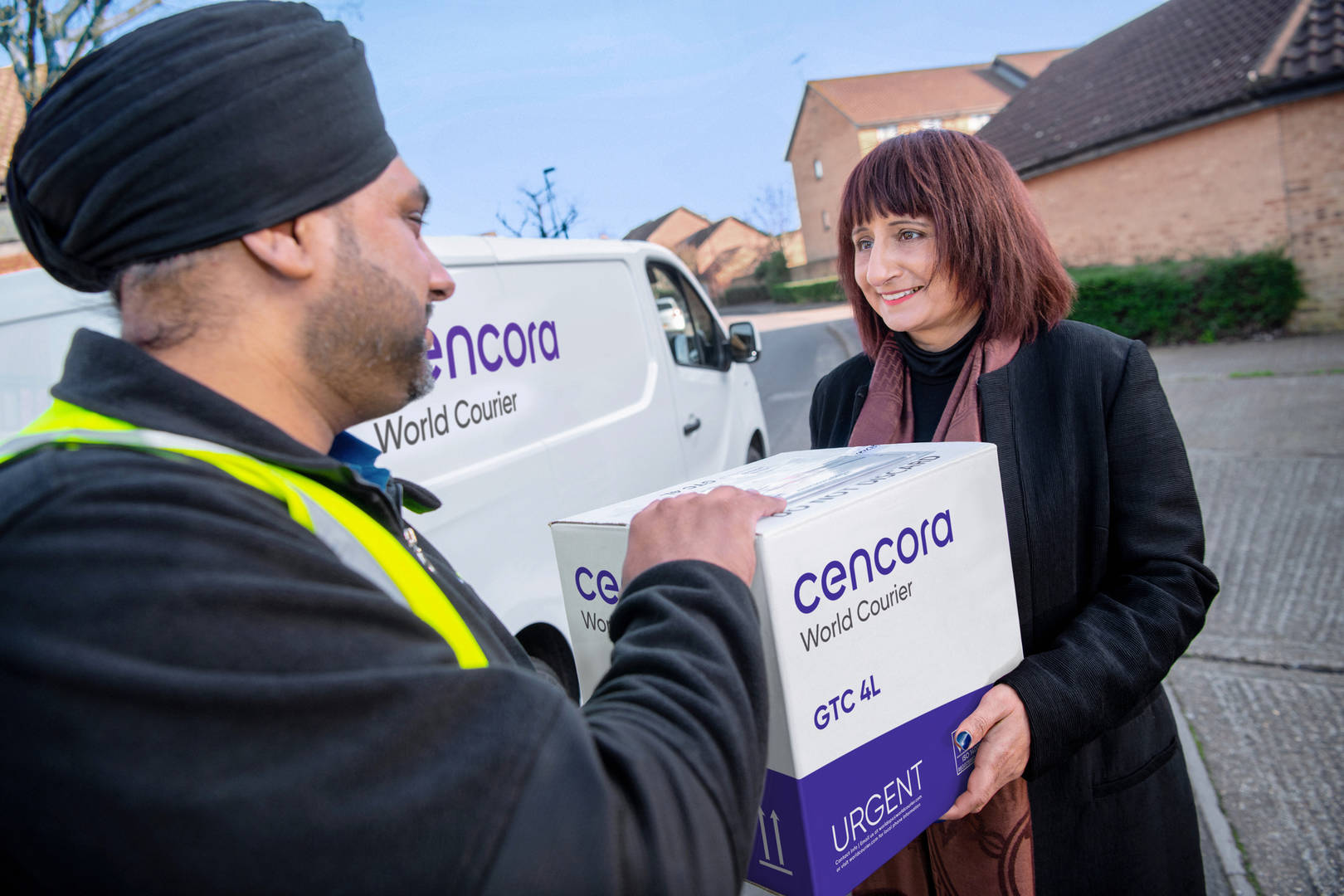Direct to patient delivery in trials: FAQs explained — part one
By Kelly Frend


A decentralized trial (DCT) is a different way of conducting clinical trials, whereby patients are treated remotely, such as in their homes, instead of at clinical site. DCTs are gaining popularity due to the growing demand for solutions to support the development of groundbreaking treatments. This can cover oncology, rare, and ultra rare diseases where the patient population is unlikely to be near a specialist center but may wish to participate in these trials, but it is not limited to these disease areas. However, for rarer diseases, patient pools are limited, making it challenging to attract and retain participants in traditional on-location trials. The global DCT market was valued at $4.5 billion in 2023 and is projected to reach $10.7 billion by 2031, growing at a compound annual growth rate (CAGR) of 15.26%1.
Direct-to-patient (DtP) and direct-from-patient (DfP) transport services are critical for effective DCTs. DtP involves delivering medications, including investigational medicinal products (IMP) and ancillaries to the patient themselves, a nurse, or caregiver. The dispense can come from several options such as the local clinic or site pharmacy, from a central pharmacy, or a depot. DfP involves collecting biological samples for central labs and unused IMP or supplies from patients in clinical trials to go back to the site, pharmacy, or depot.
Depot-to-patient and depot-from-patient models can be considered as an approach, depending on the location as this is only permitted in certain countries. World Courier can support where the depot is licensed to carry out dispensing. There are a number of reasons for this model to be considered, including:
- Lack of clinical sites to support the trial
- Lack of storage capabilities at clinical sites
- Limited capacity at clinical sites to manage shipment order management, temperature monitoring, and documentation
Central dispensing from a regional pharmacy or depot has emerged as a solution to address some of the challenges of the DtP model. It has the potential to address existing DtP challenges by enabling central storage, dispensing, and transport of IMPs or approved drugs to and from patient homes.
To successfully implement this model, it is crucial to understand potential roadblocks and develop effective strategies. In the first part of this two-part series, I will be answering your burning real-life questions that I frequently receive. As Senior Manager of Personalized Supply Chain, I'm excited to share my insights and help you create a successful DtP strategy to support decentralized clinical trials.
Q: What are the advantages of DCTs for patients?
A significant challenge in clinical trials is the high attrition rate, with 85% of trials failing to retain sufficient patient numbers. The average dropout rate stands at 30%, and approximately half of all trials fail to recruit even a single patient2. This hampers development and approval of treatments. Particularly when you have a limited patient pool for some disease areas, it is even more critical to retain trial participants.
DCTs, which often involve conducting trials in patients’ homes or local communities with the support of trained home healthcare professionals, offer a promising solution to address these issues. They provide several key advantages:
- Accelerated timelines: DCTs are associated with shorter timelines, offering financial benefits ranging from 5 to 14 times in Phase II and Phase III trials compared with traditional approaches3. By potentially bringing new treatments to market faster and more cost-effectively, DCTs can improve the return on investment for pharmaceutical companies while also benefiting patients by providing quicker access to new treatments.
- Enhanced patient recruitment: DCTs facilitate participant recruitment and expand the geographical reach of trials. This broader reach allows researchers to access diverse patient populations, including those in remote areas or with limited mobility, potentially leading to more representative study cohorts and faster enrollment rates.
- Improved patient experience: DCTs benefit patients by saving time and minimizing disruptions to their daily lives. This convenience factor reduces the burden of frequent clinic visits, but also allows patients to maintain their regular routines and responsibilities, potentially leading to higher satisfaction rates and improved retention in clinical trials. This is particularly important when considering juveniles, infants, and vulnerable patients.
By leveraging the potential of DCTs, pharmaceutical companies can address the challenges of traditional clinical trials, ultimately leading to faster drug development, improved patient outcomes, and broader access to innovative treatments. It allows a greater degree of flexibility in the approach, and we tend to see a mix of models and opt-in options for remote trial participation being a feature within the standard model application, particularly after the pandemic, this provides great flexibility. This is attractive for the patient as it allows them to have some control in and around their normal daily lives whilst fulfilling a treatment pathway.

Q: How does World Courier support decentralized trials?
DCTs offer geographical reach expansion and an enrollment boost for clinical trial sponsors. However, such trial models demand specialized logistics services. These services include shipping materials to patients’ homes, doctors’ offices, local site pharmacies, or hospitals.
The DCT model can provide companies with a greater degree of flexibility and agility when conducting clinical trials. World Courier possesses the global scale to meet any clinical trial sponsor’s needs. They can provide packaging, monitoring on a global scale, multiple methods of generating shipments, online track and trace, as well as alerts throughout the shipment’s lifecycle.
World Courier has well over a decade of experience serving DCTs. This experience enables us to support clinical trial sponsors in delivering successful decentralized trials.
World Courier is well set up to support these trials as we have a global quality management system (QMS) and dedicated training related to DCTs. Further to transport, we have a well-established depot network and can support the storage of materials until such a time as required, thus keeping the overage to a minimum for the site. Or in some cases, no site is involved, and the depot dispenses the medication (license dependent) which is then transported directly to the patient's residence.
Beyond clinical trials, World Courier’s DCT services can transport commercial, early-access, and managed-access treatments to patients, including compassionate use cases.
Q: Does World Courier handle shipments from a central dispensing model and site pharmacy?
World Courier is here to support the transport and storage (at depot) needs a customer may have. These models can vary depending on the geography, but most importantly, the legislative requirements. This is the driver of how and what a sponsor can achieve when approaching clinical trial set up. The short answer: Yes, we can support the central model, as we leverage our global network to facilitate the collection and onward delivery whether it be in the U.S., serving all federal states (the central pharmacy must be licensed appropriately) or elsewhere where this model can be adopted.
The same rule of thumb applies in that we need to ensure the schedule around the patient, nurse, or caregiver, as this is the known factor at the time of booking and track back from there for optimal collection to ensure the delivery window is met.
Central dispensing is an effective solution to address common DCT challenges, such as effective and transparent inventory management, reconciling cost-efficiency, and product integrity.
Q: Is World Courier able to support depot-to-patient?
World Courier is licensed to offer depot-to-patient services in some countries — this is a form of DCT that entails the product being shipped to a depot which could be in country or be a regional facility (all license dependent) in order to ship to the patient’s location, without the need to go via a site. These countries include Australia, Mexico, India, Singapore, Uruguay, Israel, and Ukraine.
Our service model is as follows:
Storage
The sponsor can potentially engage an at-home trial support company — such as a contract research organization (CRO) — to provide nursing services and execute the study protocol on their behalf. World Courier provides local dispensing capabilities to transport the product directly to the patient or nurse if involved.Transport
World Courier delivers the product to the patient or relevant party and where applicable collects any samples to return to labs. Depot-to-patient is ideal for use when clinical sites and site pharmacies are overloaded, or when site pharmacies lack capacity, licenses, or equipment for storage.
Q: Where is it possible to perform DCTs?
Two key factors influence the feasibility of DCTs: local legislation and location characteristics.
Local legislation:
The approval process for DCTs (DtP/DfP or depot-to-patient) varies from country to country. Countries like the U.S. have clear guidelines and frameworks for conducting DCTs, such as the Food and Drug Administration’s (FDA’s) supportive regulations for sponsors and manufacturers.In other countries, specific guidance for DCTs may not exist. However, when submitting a clinical trial application, the DCT model can be included within the scope of the planned project. However, in some countries — such as Serbia for example — DtP is explicitly prohibited by law, at this point in time.
Location characteristics:
The location itself can also affect the feasibility of a DCT model. Although World Courier’s network provides access to a vast global area, factors like shelf lives and poor infrastructure can pose challenges. Accessibility to some areas — due to poor transport infrastructure or flights — which can be a factor in less-developed countries or regions.
Q: Does World Courier have a home healthcare professionals' network?
World Courier does not have a dedicated network of home healthcare professionals. Instead, it embraces an agnostic approach, allowing clients the freedom to choose their preferred providers.
As a member of the Cencora family of companies, World Courier can leverage the resources and expertise of its partner organizations. Additionally, World Courier maintains a roster of trusted and vetted partners with whom it has successfully collaborated in the past. These partners can be recommended to clients seeking reliable and proven home healthcare services.




.jpg?h=56&iar=0&w=56&useCustomFunctions=1¢erCrop=1&hash=5C3BF081DEFE0CD4643E0D660948B3B2)


